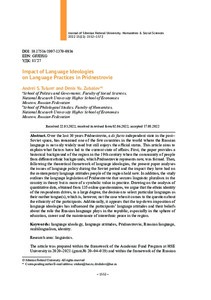Impact of Language Ideologies on Language Practices in Pridnestrovie
Скачать файл:
URI (для ссылок/цитирований):
https://elib.sfu-kras.ru/handle/2311/148777Автор:
Tulum, Andrei S.
Zubalov, Denis Yu.
Тулум, А. С.
Зубалов, Д. Ю.
Дата:
2022-11Журнал:
Журнал Сибирского федерального университета. Гуманитарные науки. Journal of Siberian Federal University. Humanities & Social Sciences; 2022 15 (11)Аннотация:
Over the last 30 years Pridnestrovie, a de facto independent state in the post-
Soviet space, has remained one of the few countries in the world where the Russian language is not only widely used but still enjoys the official status. This article aims to explain what factors have led to the current state of affairs. First, the paper provides a historical background of the region in the 19th century when the community of people from different ethnic backgrounds, which Pridnestrovie represents now, was formed. Then, following the theoretical framework of language ideologies, the present paper analyses the issues of language policy during the Soviet period and the impact they have had on the contemporary language attitudes people of the region hold now. In addition, the study outlines the language legislation of Pridnestrovie that secures linguistic pluralism in the country in theory but is more of a symbolic value in practice. Drawing on the analysis of quantitative data, obtained from 135 online questionnaires, we argue that the ethnic identity of the respondents drives, to a large degree, the decision to select particular languages as their mother tongue(s), which is, however, not the case when it comes to the question about the ethnicity of the participants. Additionally, it appears that the top-down imposition of language ideologies has influenced the participants’ language attitudes and their beliefs about the role the Russian language plays in the republic, especially in the sphere of education, career and the maintenance of interethnic peace in the region В течение последних 30 лет Приднестровье, de facto независимое
государство на постсоветском пространстве, остаётся одной из немногих территорий
в мире, где русский язык не только широко используется, но и по-прежнему
имеет
официальный статус. Цель данной статьи – объяснить, какие факторы привели
к формированию текущей языковой ситуации в регионе. Прежде всего в работе
рассматривается историческая перспектива, а именно XIX век, когда на территории
современного Приднестровья сложилось то многоязычное и полиэтничное сообщество,
которое проживает в республике сегодня. Далее в рамках концепции языковых
идеологий анализируются особенности и проблемы языковой политики советского
периода и влияние, которое они оказали на современные языковые установки
жителей региона. Кроме того, в статье приводится анализ языкового законодательства
Приднестровья, призванного защитить исторически сложившийся языковой плюрализм
в республике, но на практике имеющий скорее символическое значение. В результате,
опираясь на анализ данных, полученных из 135 онлайн-анкет,
стало возможным
прийти к выводу, что этническое самосознание респондентов в значительной степени
определяет решение о выборе определенных языков в качестве их родного языка
(языков), что, однако, не относится к вопросу этнической принадлежности участников.
Также стало ясным, что навязывание языковых идеологий на государственном уровне
повлияло на языковые установки участников исследования и их убеждения о роли
русского языка в республике, особенно в сфере образования, карьеры и поддержания
межэтнического мира в регионе
Коллекции:
Метаданные:
Показать полную информациюСвязанные материалы
Показаны похожие ресурсы по названию, автору или тематике.
-
Ethnolinguistic Ecology of the Peoples of the North, Siberia and the Far East (On the Material of the Languages of the Northern Group of the Manchu-Tungus Languages)
Petrov, Alexander A.; Razumovskaya, Veronica A.; Петров, А. А.; Разумовская, В. А. (Сибирский федеральный университет. Siberian Federal University, 2019-08)The article is devoted to the problem of ethnolinguistic ecology of the indigenous peoples of the North, Siberia and the Far East — speakers of the northern group of the Manchu-Tungus languages of the Altai linguistic ... -
Ethnolinguistic Ecology of the Peoples of the North, Siberia and the Far East (On the Material of the Languages of the Northern Group of the Manchu-Tungus Languages)
Petrov, A. A.; Razumovskaya, V. A. (2019-08)The article is devoted to the problem of ethnolinguistic ecology of the indigenous peoples of the North, Siberia and the Far East — speakers of the northern group of the Manchu-Tungus languages of the Altai linguistic ... -
The Factors of British and American English Development under Globalisation
Melnichenko, Konstantin A.; Мельниченко, К.А. (Сибирский федеральный университет. Siberian Federal University., 2014-06)The paper studies the processes which arise during language contacts between the most influential varieties of the English language, British English and American English (BE and AE), and various autochthonous languages ... -
Этноязыковая ситуация Красноярского края в начале третьего тысячелетия
Фельде, О.В.; Felde, Olga V. (Сибирский федеральный университет. Siberian Federal University., 2011-07)This article presents the up-to-date view of ethno-linguistic situation in polylanguage and polycultural the Krasnoyarsk Territory. The functional typology of languages of this Siberian region has been given; historical ... -
Problems of Preserving the Kazakh Language in China: Threats of Extinction and Ways of Solution
Zharkynbekova, Sholpan K.; Tazhibayeva, Saule Zh.; Filchenko, Аndrey U.; Жаркынбекова, Ш. К.; Тажибаевa, С. Ж.; Фильченко, А. Ю. (Journal of Siberian Federal University. Сибирский федеральный университет, 2025-03)This article examines the Kazakh language spoken in China, focusing on its unique characteristics, historical development, and challenges in the context of globalization and sociolinguistic transformations. The study ...

